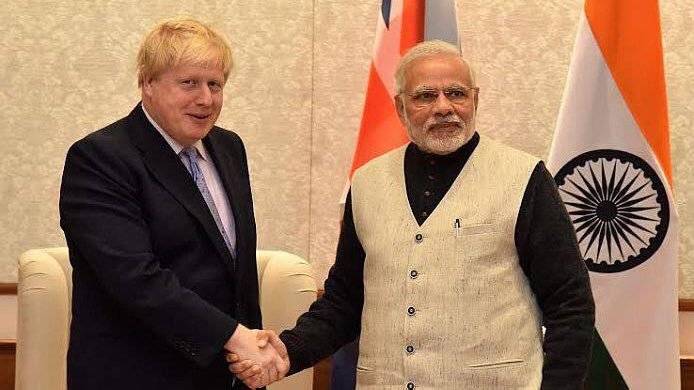
Indian Prime Minister Narendra Modi has contacted his British counterpart Boris Johnson to complain about the demonstrations outside the Indian high commission in London over India’s decision to revoke the special status of occupied Kashmir, a UK foreign ministry said.
Last week, thousands of protestors holding Pakistani and Kashmiri flags assembled outside the Indian high commission in London on India’s Independence Day.
The protestors raised anti-India and anti-Modi to denounce New Delhi’s move to strip Kashmir of its special constitutional status.
Modi’s supporters and members of the Bharatiya Janata Party (BJP) later leveled allegations against the protestors by saying that the demonstrators had attacked women and children of Indian origin with bottles and eggs, adding that the British authorities had failed to control the crowd.
London Metropolitan Police said in a statement that they arrested four people for brawling, obstruction of police and possession of an offensive weapon.
In his telephonic conversation with Johnson, Modi said that vested interests were behind the protests and were pushing forward their agenda through violence and unrest. The UK foreign ministry statement said that, “Modi specifically referred to violence and vandalism perpetrated by a large mob against Indian high commission in London on India’s Independence Day.”
The foreign ministry statement further said that Prime Minister Johnson while regretting the incident assured Modi that steps would be taken to improve the safety and security of the High Commission, the staff working there and visitors who frequented the place.
The two prime ministers also spoke about the problem of terrorism and how it was affecting Indian and Europe, the statement added.
Further, the UK foreign ministry also said, “He (Modi) highlighted the importance of effective steps to ward off the threats posed by radicalisation, violence and intolerance, especially in light of the expanding influence of terrorist organisations such as ISIS.”
New Delhi’s decision to strip Kashmir of its special status would have dire consequences for the people of Jammu and Kashmir who would lose exclusive rights to property, government jobs and other problems.
Last week, thousands of protestors holding Pakistani and Kashmiri flags assembled outside the Indian high commission in London on India’s Independence Day.
The protestors raised anti-India and anti-Modi to denounce New Delhi’s move to strip Kashmir of its special constitutional status.
Modi’s supporters and members of the Bharatiya Janata Party (BJP) later leveled allegations against the protestors by saying that the demonstrators had attacked women and children of Indian origin with bottles and eggs, adding that the British authorities had failed to control the crowd.
London Metropolitan Police said in a statement that they arrested four people for brawling, obstruction of police and possession of an offensive weapon.
In his telephonic conversation with Johnson, Modi said that vested interests were behind the protests and were pushing forward their agenda through violence and unrest. The UK foreign ministry statement said that, “Modi specifically referred to violence and vandalism perpetrated by a large mob against Indian high commission in London on India’s Independence Day.”
The foreign ministry statement further said that Prime Minister Johnson while regretting the incident assured Modi that steps would be taken to improve the safety and security of the High Commission, the staff working there and visitors who frequented the place.
The two prime ministers also spoke about the problem of terrorism and how it was affecting Indian and Europe, the statement added.
Further, the UK foreign ministry also said, “He (Modi) highlighted the importance of effective steps to ward off the threats posed by radicalisation, violence and intolerance, especially in light of the expanding influence of terrorist organisations such as ISIS.”
New Delhi’s decision to strip Kashmir of its special status would have dire consequences for the people of Jammu and Kashmir who would lose exclusive rights to property, government jobs and other problems.
